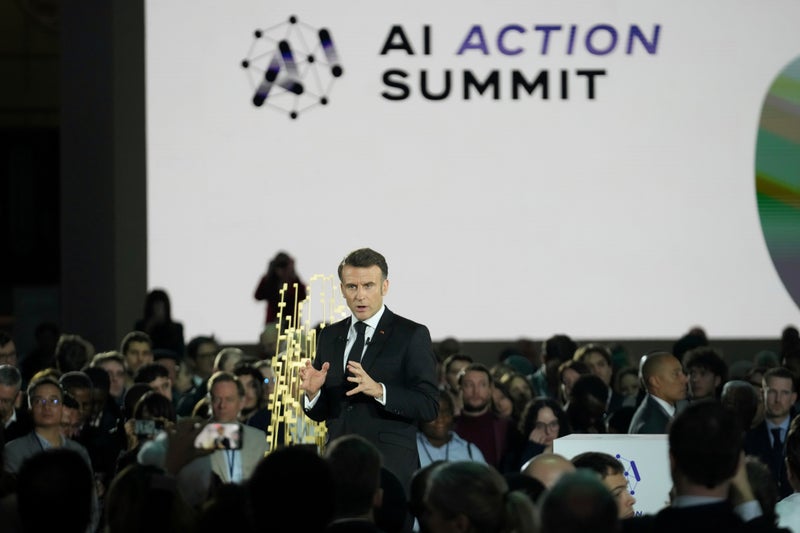Tech secretary stresses UK’s important role before global AI summit in Paris discusses issues such as governance. The artificial intelligence race must be led by “western, liberal, democratic” countries, said the UK technology secretary in a veiled warning over China’s role in the contest, before a global AI summit in Paris. Peter Kyle spoke as political leaders and tech company bosses gather in France, and after the emergence of a new Chinese force in AI, DeepSeek, rattled US investors and upended assumptions about Silicon Valley’s leadership in the technology.
![[Peter Kyle, photographed at the NSPCC office in London]](https://i.guim.co.uk/img/media/ff0e8f03b5d465826cc4e3a34039cdbebe7e8617/0_669_10000_6000/master/10000.jpg?width=445&dpr=1&s=none&crop=none)
The tech minister told the Guardian he would use the summit to explain why Britain should be at the forefront of developing AI. As well as allowing global leaders and companies to “come together and learn from each other”, the summit would give the UK a chance to show why it had the “skills and the scientific pedigree” that were “going to be essential if western, liberal, democratic countries are to remain at the forefront of this critical technology”, he said.
Kyle added that AI would have an impact on every part of the economy and society, including national security and defence. “Government does have agency in how this technology is developed and deployed and consumed. We need to use that agency to reinforce our democratic principles, our liberal values and our democratic way of life,” he said, adding that he was under no illusion. There were “some [other] countries that seek to do the same for their ways of life and their outlooks”, he said.
Kyle said he was not “pinpointing one country”, but it was important that democratic countries prevailed so “we can defend, and keep people safe”. The advances made by DeepSeek were described as a “sputnik moment” for the AI industry by one US investor after the Chinese company released a model last month that performed comparably or better than US rivals and was developed at lower cost. Kyle also confirmed last month that British officials would scrutinise the national security implications of DeepSeek and its eponymous chatbot.
Kyle said the emergence of DeepSeek would spur countries and companies at the forefront of the AI race to redouble their efforts in developing the technology. “I am enthused and motivated by DeepSeek. I’m not fearful,” he said. The AI Action Summit on 10 and 11 February will be co-hosted by the French president, Emmanuel Macron, and India’s prime minister, Narendra Modi. Also attending will be the US vice-president, JD Vance, the European Commission president, Ursula von der Leyen, and the German chancellor, Olaf Scholz. China will be represented by the vice-premier, Zhang Guoqing. Leading tech figures attending include the Google boss Sundar Pichai and Sam Altman, the chief executive of the company behind ChatGPT, OpenAI. Google’s Nobel prize-winning AI head, Demis Hassabis, will also be at the summit, as well as senior academics and civil society groups.
Kyle defended Keir Starmer’s decision not to attend, saying the UK prime minister had “indisputably” shown leadership on AI by playing a leading role in developing the government’s recent AI action plan. “People shouldn’t underestimate [Starmer’s] personal achievements when it comes to this agenda, which will be a leading part of the discussion in Paris and beyond,” he said. The summit will not focus as heavily on safety as the inaugural 2023 gathering at Bletchley Park in the UK and will instead centre on issues such as jobs, culture and global governance.
Sign up to First Edition. Our morning email breaks down the key stories of the day, telling you what’s happening and why it matters. after newsletter promotion. Announcements are also expected on making AI development – an energy-intensive process – more environmentally friendly, and launching a fund to make AI (the term for computer systems performing tasks that typically require human intelligence) broadly accessible worldwide. The use of copyrighted material to build AI models, one of the most contentious features of AI development, is also on the agenda at the summit.
Kyle was speaking as the government officially opened bidding for “AI growth zones” that will host new datacentres for training and operating AI models and systems. The tech secretary said he hoped “left behind” regions, or parts of the country that have lost formerly strong industries, would be at the forefront of bidding. “We are putting extra effort in finding those parts of the country which for too long, have been left behind when new innovations, new opportunities are available,” he said. “We are determined that those parts of the country are first in the queue to benefit … to the maximum possible from this new wave of opportunity that’s striking our economy.”.
The government said there was already interest from sites in Scotland, Wales, and the north-east and north-west of England. Kyle said parts of the country that had “formerly energy-intensive” regions could benefit from connections to the national power grid. Datacentres – the central nervous system of AI technology – are power-intensive, and the government said it would “work with network operators” to boost energy provision in growth zones to more than 500MW, enough to power about 2m homes.






















